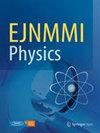SLIC-Occ: functional segmentation of occupancy images improves precision of EC50 images
IF 3
2区 医学
Q2 RADIOLOGY, NUCLEAR MEDICINE & MEDICAL IMAGING
引用次数: 0
Abstract
Drug occupancy studies with positron emission tomography imaging are used routinely in early phase drug development trials. Recently, our group introduced the Lassen Plot Filter, an extended version of the standard Lassen plot to estimate voxel-level occupancy images. Occupancy images can be used to create an EC50 image by applying an Emax model at each voxel. Our goal was to apply functional clustering of occupancy images via a clustering algorithm and produce a more precise EC50 image while maintaining accuracy. A digital brain phantom was used to create 10 occupancy images (corresponding to 10 different plasma concentrations of drug) that correspond to a ground truth EC50 image containing two bilateral local “hot spots” of high EC50 (region-1: 25; region-2: 50; background: 6–10 ng/mL). Maximum occupancy was specified as 0.85. An established noise model was applied to the simulated occupancy images and the images were smoothed. Simple Linear Iterative Clustering, an existing k-means clustering algorithm, was modified to segment a series of occupancy images into K clusters (which we call “SLIC-Occ”). EC50 images were estimated by nonlinear estimation at each cluster (post SLIC-Occ) and voxel (no clustering). Coefficient of variation images were estimated at each cluster and voxel, respectively. The same process was also applied to human occupancy data produced for a previously published study. Variability in EC50 estimates was reduced by more than 80% in the phantom data after application of SLIC-Occ to occupancy images with only minimal loss of accuracy. A similar, but more modest improvement was achieved in variability when SLIC-Occ was applied to human occupancy images. Our results suggest that functional segmentation of occupancy images via SLIC-Occ could produce more precise EC50 images and improve our ability to identify local “hot spots” of high effective affinity of a drug for its target(s).SLIC-Occ:占用图像的功能性分割提高了 EC50 图像的精确度
正电子发射断层成像药物占位研究是早期药物开发试验的常规方法。最近,我们小组推出了拉森图滤波器,这是标准拉森图的扩展版本,用于估算体素级占位图像。占用图像可通过在每个体素上应用Emax模型来创建EC50图像。我们的目标是通过聚类算法对占位图像进行功能聚类,在保持准确性的同时生成更精确的 EC50 图像。我们使用数字脑模型创建了 10 幅占位图像(对应于 10 种不同的血浆药物浓度),这些图像与包含两个高 EC50 双侧局部 "热点"(区域-1:25;区域-2:50;背景:6-10 ng/mL)的基本真实 EC50 图像相对应。最大占用率定为 0.85。对模拟的占位图像应用已建立的噪声模型,并对图像进行平滑处理。简单线性迭代聚类(Simple Linear Iterative Clustering)是一种现有的 K 均值聚类算法,经修改后可将一系列占位图像分割成 K 个聚类(我们称之为 "SLIC-Occ")。通过非线性估算对每个群组(SLIC-Occ 后)和体素(无聚类)的 EC50 图像进行估算。变异系数图像分别在每个聚类和体素上进行估算。同样的方法也适用于之前发表的一项研究中产生的人体占位数据。将 SLIC-Occ 应用于占位图像后,EC50 估计值的变异性在人体模型数据中降低了 80% 以上,准确性损失很小。将 SLIC-Occ 应用于人体占位图像时,变异性也得到了类似的改善,但幅度较小。我们的研究结果表明,通过 SLIC-Occ 对占位图像进行功能性分割可以生成更精确的 EC50 图像,并提高我们识别药物对其靶点具有高有效亲和力的局部 "热点 "的能力。
本文章由计算机程序翻译,如有差异,请以英文原文为准。
求助全文
约1分钟内获得全文
求助全文
来源期刊

EJNMMI Physics
Physics and Astronomy-Radiation
CiteScore
6.70
自引率
10.00%
发文量
78
审稿时长
13 weeks
期刊介绍:
EJNMMI Physics is an international platform for scientists, users and adopters of nuclear medicine with a particular interest in physics matters. As a companion journal to the European Journal of Nuclear Medicine and Molecular Imaging, this journal has a multi-disciplinary approach and welcomes original materials and studies with a focus on applied physics and mathematics as well as imaging systems engineering and prototyping in nuclear medicine. This includes physics-driven approaches or algorithms supported by physics that foster early clinical adoption of nuclear medicine imaging and therapy.
 求助内容:
求助内容: 应助结果提醒方式:
应助结果提醒方式:


